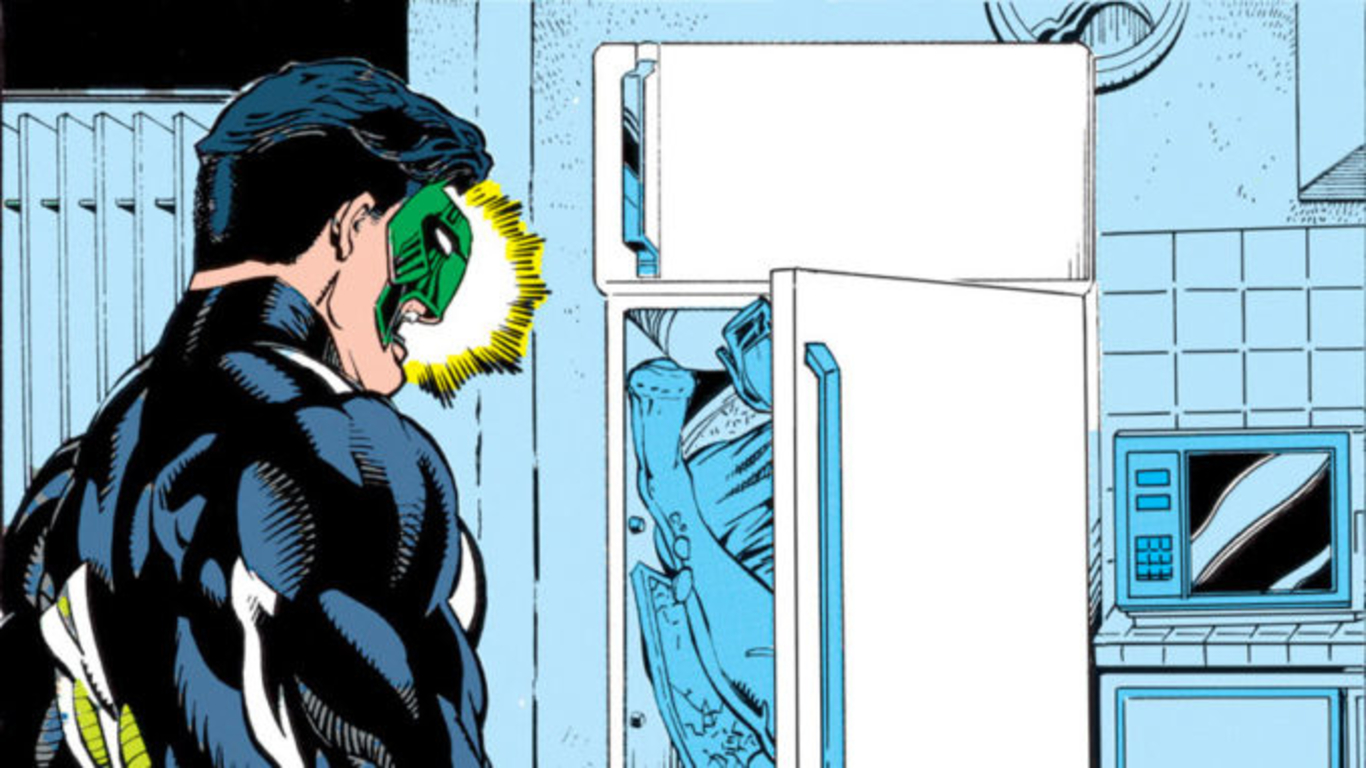The Lukewarm Appeal of the “Women In Refrigerators” Trope


Like most bookworms, I’ve spent a good majority of this quarantine hunkered down with novels. And in preparation for NaNoWrimo this November, I’ve also been diving headfirst into writing, using some of fantasy and sci-fi’s most popular reads as inspo: Lord Of The Rings, Game Of Thrones, Dune, Necromancer … the list goes on.
But as I’ve pored over and reread most of these classics, I’ve noticed an uncomfortable pattern when it comes to the treatment of women in classic sci-fi/fantasy: they get treated pretty questionably at best … and really, really badly at worst. Oftentimes, in order to propel the male protagonist’s character development (or serve as tragic backstory for his story arc) female characters are abused, disrespected, or killed off in uncomfortably gruesome ways.
In the image above, we see this being played out in the comic book panels: Kyle Rayner (the Green Lantern of the Emerald Twilight Arc) comes home to discover that his girlfriend Alexandra DeWitt has been murdered and left in a refrigerator for him to find. And thus the name for this plot device was born: the “Women in Refrigerators” trope.
To put it more concretely, “Women in Refrigerators” is a plot device in which female characters are maimed, killed, or violated in order to propel the character development of the male protagonist. There is often no further autonomy given to this female character except to serve as a vehicle for angst and self-growth in the male character. We’ve talked a lot about women being “fridged” in movies and TV shows, but less so in books—where many of those later adapted narratives began.
For obvious reasons, this is a really terrible trope. Not only because it reduces a female character to becoming a one-dimensional emotional tool—but because it refuses to take into account the other ways in which a character can receive wisdom, character, and triumph. Why must a female character be disrespected in order to allow the male character to mature?
For what it’s worth, the prevalence of this trope in classic sci-fi/fantasy makes more sense when you remember the time period in which these works were written in—and furthermore, the demographic that dominated the genre around that time as well.
But even though speculative fiction has made great progress in its treatment of women in recent years, that doesn’t mean that it’s perfect. Reading these classic and popular books made me realize the ways in which the “Woman in Refrigerators” trope has been recycled and re-interpreted in newer works. And it also made me remember the influence that these classic works can have on the ones that follow, even if the ideals presented in them haven’t aged well.
So this is a reminder that if you are creating a female character who is destined to meet a grisly end, or who deals with abuse or trauma, it’s important to intentionally examine why she is experiencing these things. Is there a greater transformation, lesson, or arc she is destined to experience? Or is her tragedy being exploited for the sake of the male character’s personal growth? And if you are expanding into other intersectionalities: confront the ways in which women of color are being treated in your work, and the reasons behind them.
It is more important than ever to create characters that are multi-dimensional and in possession of an agency that fulfills the story, rather than feeds into an archaic cliché. It is important to give female characters the opportunity to be more than a damsel in distress or an emotional plot device. This is not to say that female characters should only have positive experiences, and it’s also not to say that any female character that experiences death or a traumatic experience is immediately being “fridged.”
Rather, the most important thing to recognize is the difference between a female character who happens to go through tragic things—versus a female character whose entire purpose is to be tragic.
(image: DC Comics)
Want more stories like this? Become a subscriber and support the site!
—The Mary Sue has a strict comment policy that forbids, but is not limited to, personal insults toward anyone, hate speech, and trolling.—
Have a tip we should know? [email protected]